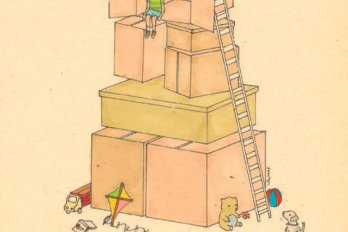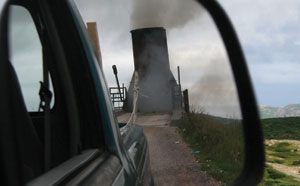tangier—It is Sunday morning, and St. Andrew’s Church on Rue d’Angleterre is nearly full. The Reverend Derek Cordell reads his sermon from a sheet of paper while Nigerian children run rowdily amid the pews. A three-year-old boy rips two pages from a prayer book before his mother snatches it from his hands and uses it to smack his bottom. A little girl in a fuzzy hat grows bored of the corn chips she is eating and dumps them on the church floor. Her brother tramples them into crumbs. The children crawl in and out of so many arms, it is hard to tell whom they belong to, but no one is able to keep them still. Eventually, the mothers shake their heads and laugh, utterly defeated by their own children.
This nineteenth-century church, which features Moorish-style architecture that owes more to its Islamic environs than its Anglican sensibility, hasn’t always been so busy. It was built to minister to Tangier’s British expatriates, who by the 1890s had outgrown the room at the Hôtel Villa de France that was set aside for them. The British community dwindled in the 1950s as Morocco claimed independence and Tangier ceased to be a foreign-controlled “international zone.” Church attendance remained low for forty years. Then the West Africans, fleeing desperate poverty, started arriving in Tangier en route to better lives in Europe. They are here illegally, and most have no permanent place to live, but at least they have a place to pray.
The Africans try their best not to look poor; dressing shabbily reminds the Moroccan police of their status and invites arrest. One woman arrives in a shapely black and gold shift and matching ribbons entwined in her braids. Others wear African-style dresses and head scarves with bold prints and bright colours. The men sport tidy shirts over their muscular frames. Plastic rosaries hang around their necks, and some have ritual scars carved into their cheeks. Many arrive late and clutch cell-phones that ring continuously.
“We Africans are passing through hell in Morocco,” Fred, a parishioner, tells me the next afternoon. Sitting on a stone bench in the churchyard, he and his friend Palace recount similar stories. Both are the eldest sons of large families in Nigeria. Both walked across the Sahara, risking ghastly desert deaths. And both hired the same Moroccan “connection man” to smuggle them across the Strait of Gibraltar to Spain in a Zodiac. The man took their money — a thousand euros each — and vanished.
“We live off of begging,” Palace says. “Only begging. We are not riff-raff.” The best place to beg is outside Tangier’s mosques; Muslims are generous after prayers, especially following the Friday sermon. But while Fred and Palace seek charity from Islam, they come to St. Andrew’s for courage. They know about the bodies that drift ashore when flimsy boats spill. And Fred knows better than anyone that reaching the other shore does not guarantee anything at all. Two years ago, he made it to Spain but couldn’t find work and was deported back to Tangier. “I will do better next time,” he says. “If you believe in God, every impossibility is to be possible. We pray that God should see us through and protect us Christians living on Arab land.”
Mustapha, the Muslim church guardian, waves me over from across the yard. For over forty years, he has been tending the garden and the gravestones and opening the church door for sightseers. He is the friendly face of St. Andrew’s, but not today. “No Nigerians,” he says, and he is so angry the red baseball cap on his head vibrates and his English becomes sloppy. “Nigerians come Sunday only. You, yes. You every day. Come garden, come sit. Nigerians, no. Come police. Nigerians problem.” He slaps my shoulder a few times as he speaks, as if to say we are in this together, he and I, against these black men. I look over to Palace and Fred. They know what is going on and are already walking toward the gate.
After his sermon, Rev. Cordell proceeds with the Sunday service. The Africans pray with their eyes shut and their hands clasped tight. Few receive communion, but nearly everyone lines up to kneel before the reverend in the sanctuary for a blessing. The mothers gather up their children so he can lay his hands on them, too. Cordell later explains that the Africans often ask him for special blessings, as well as such religious articles as crucifixes, rosaries, and Bibles — something tactile. They seek to touch God.
Cordell, whose unruly eyebrows are the very manifestation of aging male Britishness, admires the Africans’ faith. “All we have is a picture of someone in heaven. The idea that God is intimate with humanity is still strong with the Africans. God is still part of their every day.” And yet, he cannot relate to them. “Their traditions are a thousand miles away from mine,” he says, and their experience too unfamiliar. “Empathy is very difficult.” This is the reverend’s third locum in Tangier. He is officially retired, and seems tired besides, but he volunteered to fill in for another month. He enjoys the solitary drive across Spain to get here.
Cordell walks behind the pews to consecrate the new church organ. Then soft voices join him in a tentative final hymn: the Africans aren’t familiar with the tune, and the reverend is admittedly tone deaf. When the service is over, a handful of English parishioners in attendance chat among the old gravestones in the church garden. The Africans mostly disappear.





